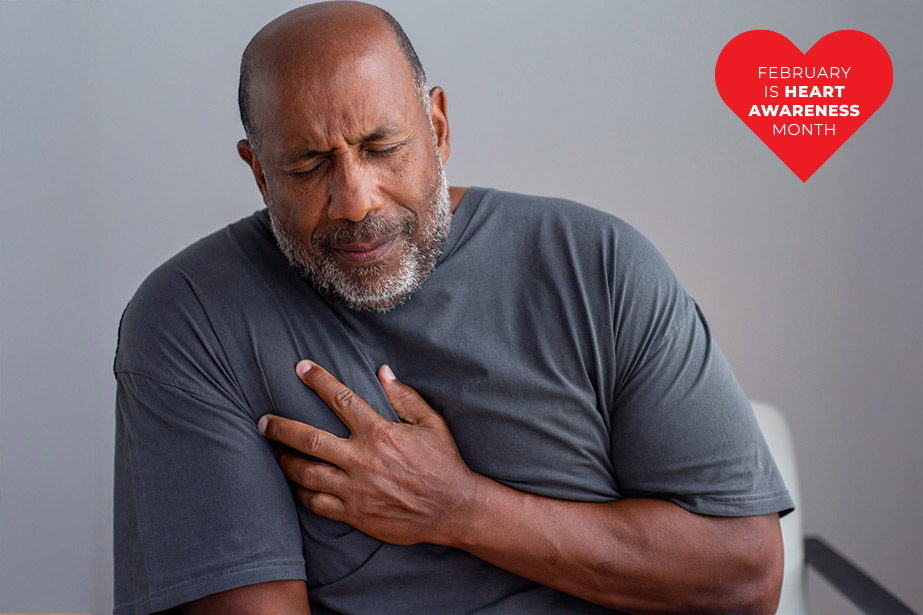Can Heart Flutters be Dangerous?
February 23, 2026


Ever had a pounding heart or felt your heart beat faster than usual? Maybe you’ve experienced the flip-flop feeling of your heart skipping a beat. Heart flutters, or palpitations, happen to many people every day.
Though an irregular heartbeat may be concerning, heart flutters aren’t always a sign of something serious. So how can you tell the difference between a harmless flutter and a dangerous change to your heartbeat?
The most important thing is to pay attention to what else is happening in your body when you notice your heart beating differently, says Demetrio Castillo, MD, an electrophysiologist (EP) at Memorial Cardiac and Vascular Institute. Get medical care right away if your heartbeat is irregular and you also have:
- Chest pain
- Dizziness
- Fainting
- Shortness of breath
Even if you’re not experiencing other symptoms with heart flutters, you may want to check in with your doctor if they keep happening. Here’s what you need to know:
Your Heartbeat Keeps Your Blood Pumping
Your heart is a muscle made up of four chambers. There are two upper chambers (atria) and two lower chambers (ventricles). Special tissue in your right atria, the sinoatrial (SA) node, continuously sends electrical signals that tell your heart to contract.
These signals move through your heart in a constant cycle. Rhythmic contractions of the chambers draw blood into your heart to replenish blood oxygen. They also send oxygenated blood back out to your body.
There Are Many Causes of Heart Palpitations
Sometimes your heart’s electrical signals misfire, causing your heartbeat to change. You may feel a fast heartbeat (tachycardia) or a slow heartbeat (bradycardia).
Many things can affect your heart’s electrical signals. If you smoke or vape, nicotine can make your heart pound. Caffeine may make ventricles contract too soon, leaving you feeling like your heart skipped a beat.
Heart palpitations can also result from:
- Drinking too much alcohol or using drugs like cocaine
- Feeling stressed or anxious
- Getting older
- Having a panic attack
- Hormonal changes during your menstrual cycle or when you’re pregnant
- Strenuous exercise
- Taking certain medicines like cold medications (decongestants)
You may also notice changes in your heart rate if you have other medical conditions. For example, an overactive thyroid gland (hyperthyroidism) can cause a fast heartbeat. If you have anemia, your blood doesn’t have enough red blood cells, and your heart may work harder to move oxygenated blood more quickly.
Frequent Heart Flutters Need Evaluation
If you have frequent heart palpitations or irregular heartbeats that last more than a few seconds, you may have an arrhythmia. Arrhythmias can occur if you were born with a heart condition (congenital heart disease). They can also happen if you have:
- Cardiomyopathy
- Coronary artery disease
- Heart failure
- History of heart attacks
Monitoring Heart Rhythms Can Help
Make an appointment to see your doctor if heart flutters are frequent or long-lasting. They’ll examine you and listen to your heartbeat. Tell your doctor about when palpitations usually happen and if you have any other symptoms. Your doctor may recommend a painless test called an electrocardiogram (EKG) to measure your heart’s electrical signals.
They may have you wear a portable device called a Holter monitor. The device records your heart rhythm for a few days as you go about your regular activities. Your doctor may also ask you to share data if you have a wearable device like a watch that records your heartbeat.
Additional Testing Can Help Diagnose Arrhythmia
If your doctor detects signs of arrhythmia, you may need more tests, such as:
- Cardiac imaging
- Cardiac catheterization
- Echocardiogram (heart ultrasound)
If you have an arrhythmia, talk with your doctor about whether you need treatment. You may benefit from cardiac ablation or an implantable device like a pacemaker or defibrillator.
Lifestyle Changes Can Help Ease Some Heart Palpitations
Not all heart flutters need treatment. Making some changes to your daily routine may help reduce the heart palpitations you feel. You should:
- Avoid consuming things that increase your heart rate, like caffeine and energy drinks.
- Manage your stress level and talk about your anxieties with someone you trust.
- Meditate to help manage anxious or racing thoughts.
- Not smoke or vape.
- Use slow, deep breathing (belly breathing or diaphragmatic breathing) to help relax your body and mind.
Call Your Doctor if Heart Flutters Change
Call your doctor if palpitations happen more often or if they’re lasting longer. Let your doctor know if you feel fatigued or notice changes in your stamina.
“If you were able to shop for groceries and now you can’t walk down the supermarket aisle without getting winded, you should be evaluated,” says Dr. Castillo.
Expert Heart and Vascular Care at Memorial
Taking care of your heart is easier when you have the right team by your side. Memorial Cardiac and Vascular Institute brings together cardiologists, heart and vascular surgeons, electrophysiologists, imaging specialists and adult congenital heart experts to deliver coordinated care across the full spectrum of heart and vascular services. Whether you are focused on prevention, managing symptoms, or exploring treatment options, our specialists are here to help you take confident steps toward better heart health.




